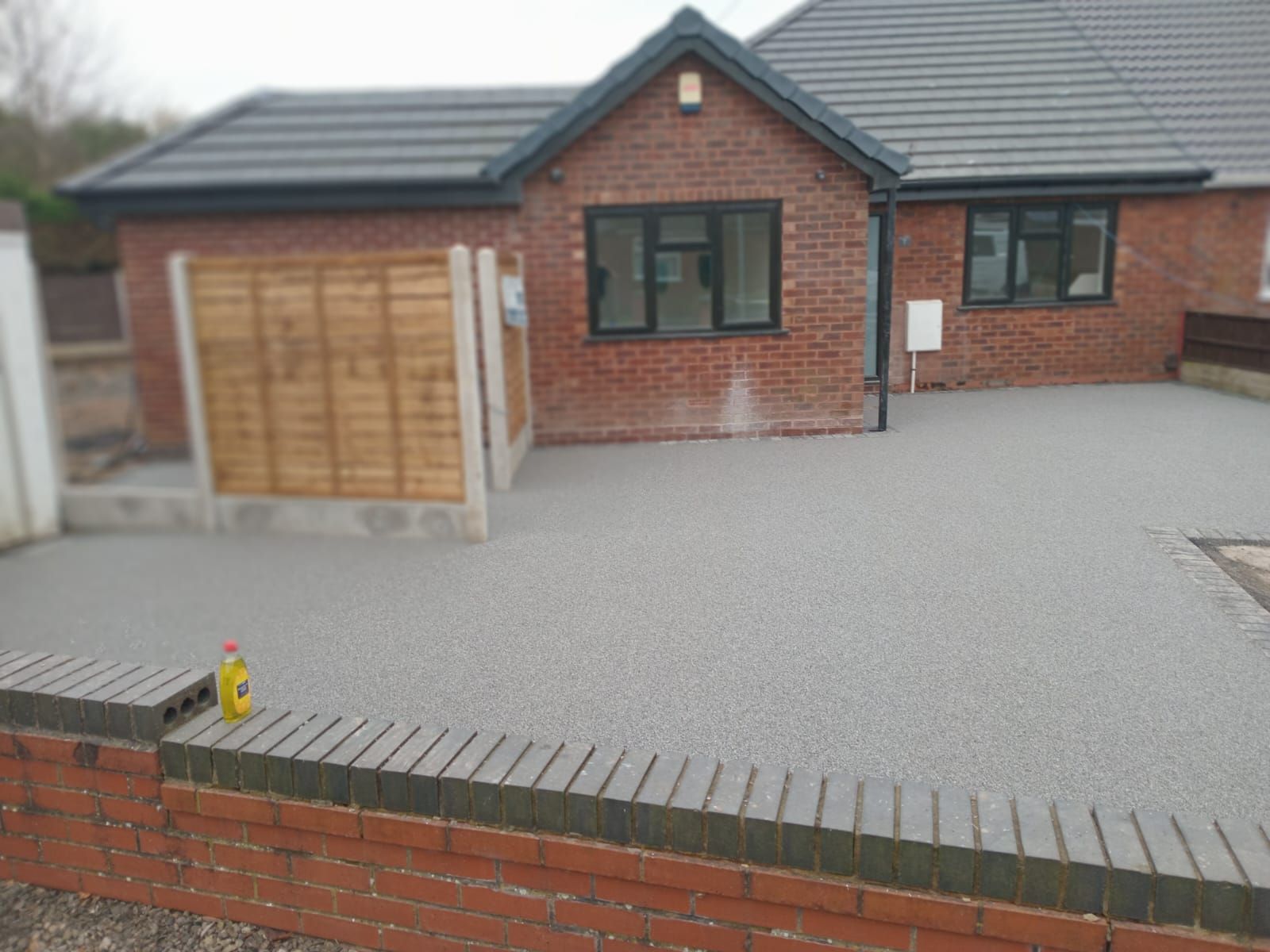Best Practices for Cleaning Resin Bound Driveways
Best Ways to clean your Resin Driveways in Essex
Resin-bound driveways are becoming increasingly popular due to their aesthetic appeal, durability, and low maintenance requirements. However, like any outdoor surface, resin-bound driveways need regular cleaning to maintain their beauty and longevity. This guide will walk you through the best practices for cleaning resin-bound driveways, ensuring you keep your investment in top condition for years to come.
Introduction to Resin-Bound Driveways
Resin bound driveways are made by mixing high-quality resin with natural aggregates such as stones, pebbles, or gravel. This mixture is then applied to a prepared surface, creating a smooth, permeable, and visually appealing driveway. Resin bound surfaces are praised for their durability, ability to resist weeds, and their capacity to drain water effectively, reducing puddles and flooding. However, to keep them looking pristine, regular cleaning and maintenance are essential.
In this article, we’ll explore the best practices for cleaning resin-bound driveways. Whether you're looking to maintain the driveway’s initial appeal or restore it after seasonal wear and tear, these tips will help you protect your investment.
Why Cleaning Your Resin-Bound Driveway Is Important
Cleaning resin-bound driveways isn’t just about keeping them looking great—it also helps prevent damage. Dirt, debris, and organic materials like moss or algae can accumulate over time. If left unchecked, these contaminants can penetrate the resin surface, leading to long-term damage, discoloration, and even degradation of the material.
Regular cleaning:
- Prevents surface staining
- Protects against the growth of weeds, algae, and moss
- Helps maintain the permeability of the surface
- Increases the lifespan of the driveway
By adopting a consistent cleaning routine, you’ll enhance your home’s curb appeal and save on potential repair costs down the line.
Best Practices for Cleaning Resin-Bound Driveways
Sweep Regularly to Remove Loose Debris
One of the simplest yet most effective methods of maintaining a resin-bound driveway is regular sweeping. Dirt, leaves, and small stones can accumulate on the surface over time. By sweeping your driveway weekly, you’ll prevent dirt from settling into the resin and causing long-term staining.
- Use a stiff broom: Soft brooms won’t effectively lift embedded debris. A stiff-bristled brush is ideal for removing leaves, small stones, and dirt.
- Sweep in a circular motion. This ensures that dirt isn’t just pushed around but effectively lifted off the surface.
Regular sweeping also keeps the surface looking tidy and minimizes the buildup of grime over time.
Rinse with Water to Remove Surface Dirt
After sweeping, rinsing your resin-bound driveway with water helps to remove any remaining loose dirt or dust. A simple wash down with a garden hose is often enough to clean up small spills or light dirt accumulation.
- Low-pressure washing: While resin-bound surfaces are durable, avoid using high-pressure washers too frequently. High pressure can loosen the resin’s bond with the aggregates, leading to surface damage over time. Instead, use a garden hose with moderate pressure to rinse the area gently.
Remove Stains Promptly
Resin-bound surfaces are resistant to staining, but oil spills, bird droppings, or tree sap can still cause marks if left for too long. It’s essential to address these stains as soon as possible to prevent permanent damage.
- Oil stains: For oil spills, soak up as much of the oil as possible with paper towels or cloths. Once the bulk of the spill has been absorbed, use a degreaser formulated for outdoor surfaces. Apply the degreaser, scrub with a stiff brush, and rinse with water.
- Organic stains: Moss, algae, or tree sap can often be treated with a diluted detergent or a specialized driveway cleaner. Scrub the area with a brush, ensuring that the cleaner is fully rinsed off afterward to prevent residue buildup.
Use a Mild Detergent for Deeper Cleans
For more thorough cleaning, especially if your driveway is very dirty, a mild detergent can be used. Mix the detergent with warm water and use a stiff brush to scrub the surface in circular motions. Be sure to rinse off any detergent thoroughly to avoid residue that can attract dirt.
You must avoid using harsh chemicals like bleach, as they can damage the resin and cause discoloration over time.
Address Weeds and Moss Early
One of the benefits of resin-bound driveways is their weed resistance. However, if dirt or organic matter builds up on the surface, there’s still a chance that weeds, moss, or algae can take root. To prevent this:
- Use a weed killer: Any visible growth can be treated with a weed killer safe for resin-bound surfaces. Make sure it is pet-safe and environmentally friendly.
- Moss and algae removers: Algae or moss can make your driveway slippery and unattractive. To address this problem, use a moss killer specifically designed for outdoor surfaces, followed by scrubbing and rinsing with water.
Avoid Using Harsh Chemicals or Acids
When cleaning a resin-bound driveway, avoid harsh chemicals or acidic cleaners. These substances can break down the resin and damage the surface over time. Instead, opt for products designed for resin-bound surfaces or general-purpose mild cleaners.
If you’re ever unsure about a cleaning product, always do a patch test on a small, inconspicuous area before using it across the whole driveway.
Professional Cleaning and Sealing for Long-Term Protection
While routine DIY cleaning is effective, professional maintenance may be necessary every few years. Professionals have access to specialised tools and cleaning solutions that can give your driveway a deeper clean. They can also reseal the surface if needed, providing added protection against weathering, stains, and wear.
Additional Tips for Long-Term Care of Resin-Bound Driveways
- Avoid heavy vehicles: Resin-bound driveways are strong, but consistently parking heavy vehicles can lead to surface indentations over time. Try to limit heavy vehicle traffic to extend the driveway’s lifespan.
- Watch out for sharp objects: Sharp tools or heavy gardening equipment can damage the surface if dropped. Always handle such objects with care.
- Keep an eye on drainage: Ensure that clogged drainage systems don’t compromise the driveway’s permeability. If water starts pooling on the surface, investigate and clear any blockages in the surrounding drains.
Conclusion: Keep Your Resin-Bound Driveway Looking Like New
Maintaining a resin-bound driveway requires little effort, but it does require consistency. By following these best practices for cleaning resin-bound driveways, you’ll protect your investment, ensure your driveway remains visually appealing, and prolong its lifespan.
From regular sweeping and rinsing to prompt stain removal and occasional professional maintenance, these simple steps will help you enjoy a stunning and durable driveway for many years. Remember, maintaining your driveway today will save you from costly repairs tomorrow.
For further information, Click here to visit our website or call Essex Resin Driveways on 01245-968085.
Click here to complete our contact form and see how we can help you with your Driveway requirements.
You might also like
Book a Service Today
We will get back to you as soon as possible
Please try again later
Location
Call
All Rights Reserved | Essex Resin Driveway | Powered by Snapps


